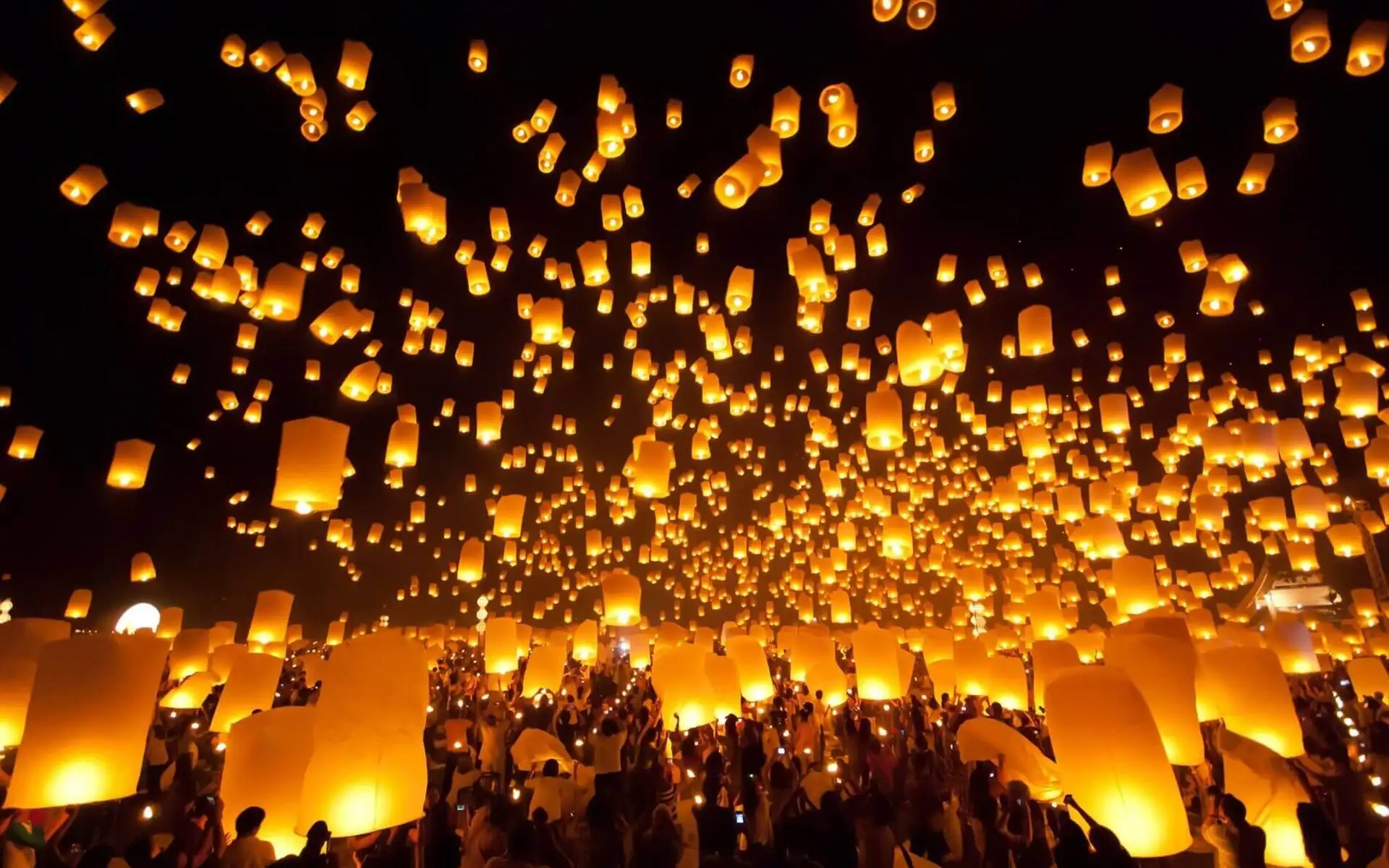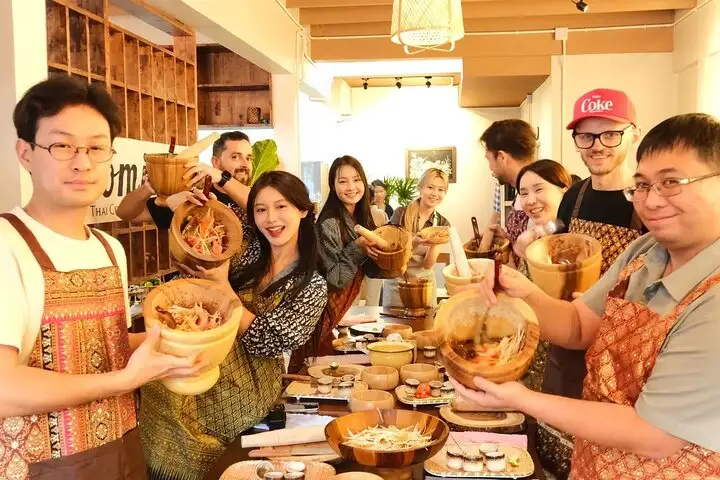Thailand, the Land of Smiles, is a cultural mosaic where ancient traditions blend seamlessly with modern life. From ornate temples to vibrant festivals, Thai culture captivates travelers with its warmth, spirituality, and sensory richness. For those eager to dive deep into Thailand’s heritage, this guide highlights must-have cultural experiences that offer authentic insights into the country’s soul. Whether you’re exploring Bangkok’s bustling streets or Chiang Mai’s serene mountains, these activities will leave you with lasting memories.
Visit iconic temples and join local rituals
Thailand’s temples, or wats, are the heart of its spiritual life, showcasing intricate architecture and Buddhist practices. Visiting Wat Phra Kaew in Bangkok (500 THB entry), home to the Emerald Buddha, is a must for its dazzling Grand Palace complex. In Chiang Mai, Wat Phra That Doi Suthep (50 THB entry) offers stunning views and a sacred atmosphere—arrive at dawn to see monks chanting. For a quieter experience, explore Wat Arun (100 THB) along Bangkok’s Chao Phraya River, known for its riverside porcelain mosaics.
To engage like a local, participate in simple rituals: light incense or offer lotus flowers (20–50 THB at temple stalls) and make a small donation. Dress modestly (cover shoulders and knees) and remove shoes before entering prayer halls. In Chiang Mai, try a monk chat at Wat Suan Dok (free, donations welcome), where young monks practice English and share Buddhist insights, offering a personal connection to Thai spirituality.
Tip: Avoid peak hours (10 AM–2 PM) for a calmer visit. Learn basic phrases like “sawasdee” (hello) to show respect.
Celebrate Thai Festivals
Thailand’s festivals are vibrant expressions of culture, blending spirituality and community. Loy Krathong (November) sees rivers glow with floating krathong baskets made of banana leaves and candles (50–100 THB to buy or make your own). Join locals in Chiang Mai or Sukhothai to release krathongs, symbolizing letting go of negativity. Songkran (April), the Thai New Year, is a nationwide water festival where streets turn into playful water fights—Ayutthaya and Phuket are top spots to join the fun (bring a waterproof bag).
Smaller festivals like Yi Peng in Chiang Mai (November) feature sky lanterns (100–200 THB) creating a magical glow. Respect local customs by following guidelines, such as placing krathongs gently in the water or avoiding alcohol during religious events. These festivals offer a chance to bond with locals and capture stunning photos.
Tip: Book accommodations early for festivals (3–6 months ahead) via Agoda. Check exact dates, as they follow the lunar calendar.

Master Thai cuisine through cooking classes
Thai food, with its bold flavors of sweet, sour, spicy, and salty, is a cultural cornerstone. Taking a cooking class lets you learn authentic recipes and connect with local ingredients. In Bangkok, Blue Elephant Cooking School (3,000 THB for a half-day) teaches dishes like tom yum and green curry in a historic mansion. In Chiang Mai, Thai Farm Cooking School (1,000–1,500 THB) includes a market tour to pick fresh herbs and spices.
Classes typically cover 4–5 dishes, from pad thai to mango sticky rice, and end with a shared meal. You’ll learn techniques like balancing chili heat or pounding curry paste, plus take home recipes to recreate the magic. Rural settings like Krabi’s Thai Charm Cooking School (1,200 THB) offer farm-to-table experiences, deepening your appreciation for Thailand’s culinary roots.
Tip: Book classes via GetYourGuide for reviews and deals. Bring a notebook to jot down tips.

Explore traditional markets
Thai markets are cultural hubs where locals shop, eat, and socialize. Chatuchak Weekend Market in Bangkok, with 15,000 stalls, offers everything from silk scarves to spicy som tam (50–200 THB). Bargain politely (aim for 10–20% off) and try street food like grilled satay (20–50 THB). In Chiang Mai, Warorot Market is a daytime staple for dried fruits and northern Thai sausages (30–100 THB).
For a unique experience, visit a floating market like Damnoen Saduak near Bangkok (1,500–2,000 THB for a tour), where vendors sell noodles and mangoes from boats. Engage with vendors using a smile and basic Thai like “tao rai” (how much?). Avoid mass-produced souvenirs; instead, buy handwoven baskets or chili pastes for authentic keepsakes.
Tip: Carry small bills (20–100 THB) for quick purchases. Visit early (7–9 AM) to avoid crowds and heat.
Experience Muay Thai
Muay Thai, Thailand’s national sport, is a cultural phenomenon blending athleticism and tradition. Watching a live match at Lumpinee Stadium in Bangkok (1,000–2,000 THB) or Thaphae Stadium in Chiang Mai (400–800 THB) is electrifying, with cheering crowds and traditional music. For a hands-on experience, join a beginner’s class at camps like Sitmonchai Gym in Kanchanaburi (500–1,000 THB/hour) to learn basic punches and kicks.
Matches often start with a wai khru ritual, where fighters honor their teachers—a nod to Muay Thai’s spiritual roots. Respect the sport’s seriousness by avoiding loud disruptions during bouts. Training camps also teach discipline and Thai values like respect, making it a cultural immersion.
Tip: Buy tickets online to avoid touts. Wear comfortable clothes for training and stay hydrated.

Discover Thai arts and crafts
Thailand’s craftsmanship, from silk weaving to pottery, reflects centuries-old techniques. In Chiang Mai, visit Baan Celadon (free entry) to see artisans create celadon ceramics or join a workshop (1,000–2,000 THB). In Bangkok, Jim Thompson House (200 THB entry) showcases Thai silk and traditional teak homes, offering a glimpse into textile heritage.
For hands-on fun, try a batik painting class in Phuket (800–1,500 THB) or a lantern-making workshop in Chiang Mai (500–1,000 THB), especially during Yi Peng. These activities connect you with artisans and support local communities. Purchase crafts directly from makers for authenticity and fair prices.
Tip: Book workshops via TripAdvisor for trusted providers. Ask artisans about their craft’s history for deeper insights.
Stay in a traditional Thai homestay
For an immersive cultural experience, stay in a homestay where you live with a Thai family. In Mae Kampong near Chiang Mai, homestays (1,000–2,000 THB/night) include home-cooked meals and activities like tea picking or bamboo weaving. In Koh Yao Noi near Krabi, homestays (800–1,500 THB) offer fishing trips and village tours.
Hosts share stories of local life, from rice farming to Buddhist traditions, fostering meaningful connections. Respect house rules, like removing shoes indoors, and bring small gifts (snacks or souvenirs) as a gesture of gratitude. Platforms like Homestay.com or Workaway list vetted options.
Tip: Learn a few Thai phrases like “khob khun” (thank you) to bond with hosts. Pack modestly for rural stays.
Practical tips for cultural experiences
- Budget: Most experiences cost 100–3,000 THB (e.g., temple entry 50–500 THB, cooking classes 1,000–3,000 THB). Daily budgets of 1,500–3,000 THB cover activities, food, and transport.
- Etiquette: Show respect by bowing slightly (wai) when greeting, avoiding public displays of anger, and not touching heads or pointing feet at sacred objects.
- Timing: Visit temples and markets early to avoid crowds. Festivals require advance planning due to high demand.
- Connectivity: Buy a TrueMove SIM (300–500 THB for 15 days) at airports or 7-Eleven for navigation and bookings.
- Health: Use sunscreen, drink bottled water, and consider vaccinations like hepatitis A for rural stays.
- Booking: Use Viator or Klook for activities and tours. Confirm inclusions (e.g., meals, gear) to avoid surprises.
Cultural sensitivity
Thai culture values harmony and respect. Always ask permission before photographing people, especially monks or villagers. Avoid criticizing the monarchy or religion, as these are deeply revered. Engage with locals warmly but respectfully, and you’ll be welcomed with Thailand’s famous hospitality.
Thailand’s cultural experiences—from temple rituals to fiery festivals and hands-on crafts—offer travelers a profound connection to its heritage. By joining locals in markets, cooking authentic dishes, or staying in a homestay, you’ll uncover the heart of the Land of Smiles. Plan your trip with respect for traditions, embrace the warmth of Thai hospitality, and let these experiences enrich your journey. Start your cultural adventure in Thailand today!
